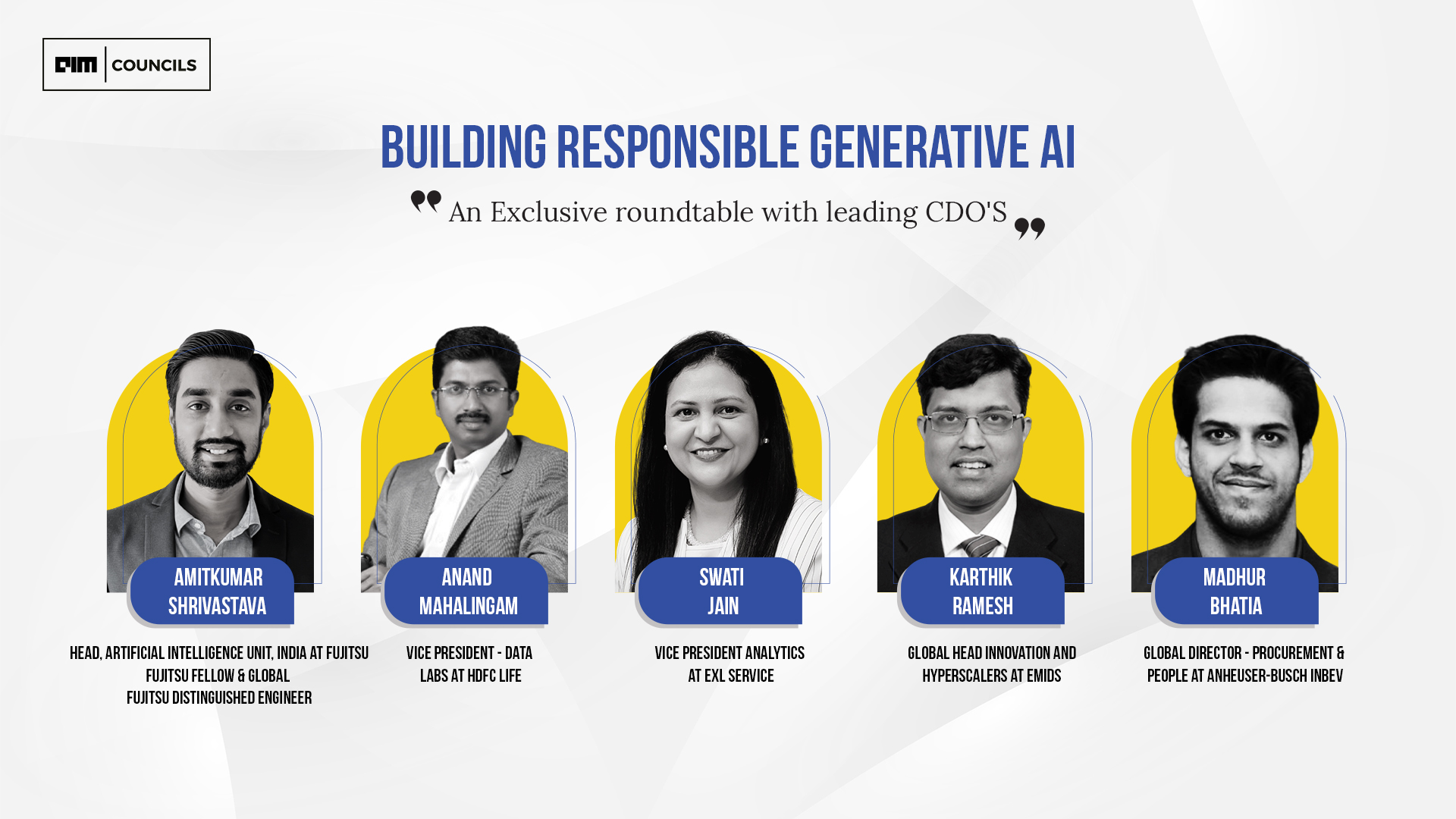|
Listen to this story
|
Today creativity has a new name, Generative AI. Type the most bizarre vision and you get versions of the same. Text may be used to create paintings instead of pixels or paint, thanks to generative AI. Through automatically produced texts, emails, and content, it enables you to communicate with consumers effectively from a commercial perspective. When properly implemented, generative AI enhances existing workflows with precision, power, speed, and convenience, freeing up workers to concentrate on more strategic or creative aspects of their job.
The public’s interest in artificial intelligence is mostly focused on generative AI. According to some predictions, generative AI will replace Internet searches and revolutionise many facets of our daily lives. In AI, we’ve heard that before. New apps frequently spark public interest.
However, generative AI differs from the majority of other forms of AI now in use. For instance, large language models may produce natural language outputs that accurately replicate coherent human speech in response to user input. Furthermore, since some of these models don’t require any prior AI expertise, much less a comprehension of the underlying math and technology, there is almost no barrier to adopting them. The results of using generative AI, like any cognitive technologies, rely on how well the risks are managed, which have not received as much attention as their ability.
With these doubts and ideas we hosted our monthly Roundtable discussion which was moderated by Amitkumar Srivastava, Head, Artificial Intelligence Unit, India at Fujitsu, Fujitsu Fellow & Global Fujitsu Distinguished Engineer along with panelists Madhur Bhatia, Global Director – Procurement & People at Anheuser-Busch InBev, Anand Mahalingam, Vice President – Data Labs at HDFC Life, Karthik Ramesh, Global Head Innovation and Hyperscalers at Emids and Swati Jain, Vice President, Analytics at ExlService.
The AI Power Couple: Generative AI Unleashed in Procurement and People Management
If you try to categorise the kinds of opportunities that most organisations are currently exploring around generative AI, one bucket would definitely be automating manual repetitive tasks. In procurement or even in the people function, there are a lot of activities that you have to do on a regular basis that could be spent categorizing for procurement or building RFPs, analysing bids from different kinds of suppliers. And identifying opportunities to negotiate with them better. The other kind of opportunity is for creating new content. It’s more obvious in areas of marketing where you can create digital advertisements using generative AI models, but specifically in people and procurement, you could use it to create job descriptions for roles that you have in the organisation, that is an activity that requires a significant amount of time and effort investment. You can also use generative AI to simplify interactions between stakeholders in your business, and not just external stakeholders through chatbots and brands, but also internal stakeholders, which are your employees. I think there are different kinds of opportunities that are available in both of these areas. Few things to be mindful of as we explore applications for generative AI are that firstly, this technology is very new, and very few people today understand these technologies fully. And obviously, this is work in progress. So, these models are not perfect, they can still not do simple things like math operations, especially if you expect the output to be at a certain degree of precision. So, to be responsible in developing applications around these models, you have to make sure that there is fairness so these models are not perpetuating any kind of bias that you may already have in your processes. And also the pitfalls, sensitising people on how they should be using these models. And then lastly, you need to ensure accountability for the team that actually creates these applications. So that they do it in a responsible way adhering to all the mechanisms that you’ve established for responsibility.
- Madhur Bhatia, Global Director – Procurement & People at Anheuser-Busch InBev
Ethics in the AI Playground: Unleashing Responsible Magic with Generative Models
Responsible AI irrespective of generative AI, is applicable. It is the same but it has a higher impact in generative AI, because it is very easy. It’s not only the technical people, even the non tech people also can make use of the agenda. So that way, responsible AI concepts for generating AI related applications need to be very sensitive. We need to look at security, privacy, fairness, reliability, safety and explainability. These are the general responsible AI framework we can come up with. Everything is important, even if you take an acing simple AI application, the privacy matters, the security matters. But we also see the generative AI side, the policy, nation and data. Downside of it, the fairness and the safety part becomes more important than the regular AI stuff. We need to make use of generative AI to validate the responsible side of AI that also can be used. There are some researchers who make use of generative AI, or to ensure that the kind of data we are putting in is sensitive data and a filtration mechanism which we can make use of.
- Anand Mahalingam, Vice President – Data Labs at HDFC Life
Revolutionising Healthcare: The Impact of Generative AI Models in Life Sciences
Stephen Hawking once famously said that while all of the success of AI is a great thing, without responsible use of that it’s obviously going to be an endgame. Research world has found out that a lot of people’s data was compromised as part of some of the initial experimentation when some of the big tech giants got into this space of using generative AI, or creating elements of responsible AI. In the healthcare industry, we can only talk about it at a high level. In the Middle East, there is a $14 trillion investment of leading life sciences companies, where they created clinical trials, drug discovery, infrastructure and framework in the most unexpected of places. Data is becoming diverse, it’s disparate, it is kind of pervasive when it comes to geographies. The Middle East is a great example when it comes to healthcare information where exchange happens across all hospitals, clinics, pharma companies and certain life science companies, which have extended presence there of using the data seamlessly across any of these locations. In the Middle East, there is a secure, interconnected way of sharing information across both public and private providers called Malaffi initiative which is a centralized public- private initiative that creates a unified view of patient records. In a generative AI security context, imagine that if some of this data accidentally is spilt into the public domain via any of the publicly available or open source LLM based/Generative AI innocuously; say to generate a summary of their clinical visits or diagnosis. Hence, along with development of Generative AI, there is a need to strengthen cyber security just as much as investing in generative AI. Quantum computing combined with the creamy layer of generative AI based on right data sets can lead to some cutting edge R&D for the Healthcare industry especially around accelerating vaccine development, clinical research, drug trials and also help mitigate frauds in the payer context. The whole concept of generative responsible AI is already disrupting the healthcare industry.
- Karthik Ramesh, Global Head Innovation and Hyperscalers at Emids
Generative AI Collaboration: Guidelines & Feedback
Any and every use case we have we need to think of how we can apply the power of generative AI across industries because of the variety of things. Almost all the problems that we are solving with analytics, Generative AI can modify the outputs. I would say that as we responsibly use, we have to see how we can prevent any misuse. And therefore, if there are any usage guidelines that are published and enforced, that would be helpful and all of us working in different facets in the industry can present our views on these guidelines. So people are aware of it and ensure that they are using it. The overall collaboration among stakeholders in the feedback loop itself, what is working, what is not working, any issues and any limitations are documented so that those weak areas are taken care of going forward. The pace with which it has grown, where ChatGPT has a million users within a few days, whereas it took months for some of the other platforms like Facebook to get a million users.
- Swati Jain, Vice President, Analytics at ExlService
To conclude,
When wielded with responsibility and ethics, generative AI serves as a transformative force across industries, from insurance and healthcare to procurement and startups. Like a renowned artist or skilful chef, the magic lies not just in the creation but in its thoughtful intent. As we embrace AI’s potential, we must also champion the principles of trust, fairness, and transparency, ensuring it uplifts humanity without compromising privacy or integrity. Whether AI dons the cape of a superhero, stars in a sci-fi movie, or recites a Hippocratic Oath, its role should always be to enhance our world rather than exploit it. Our journey with AI is akin to an ‘ethical AI Olympics,’ where the ultimate prize is a future where technology and ethics harmoniously coexist. With its immense potential comes equally great responsibility. Our aim should not be to create but to create wisely and ethically. We must harness this technology to build a better world, ensuring it serves as a tool for innovation, inclusivity, and positive change rather than a conduit for harm or division. Responsible use of generative AI is not just an aspiration; it’s a necessity for the sustainable, equitable future we all strive for. As leaders in this field, our duty is not merely to innovate but to guide this innovation down a path that respects and upholds our shared values. In this grand narrative of AI, let us strive to be the authors of a story that future generations will be proud to read. And yes, we need a team of avengers.
- Amitkumar Srivastava, Head, Artificial Intelligence Unit, India at Fujitsu, Fujitsu Fellow & Global Fujitsu Distinguished Engineer
This article is written by a member of the AIM Leaders Council. AIM Leaders Council is an invitation-only forum of senior executives in the Data Science and Analytics industry. To check if you are eligible for a membership, please fill out the form here.







































































































